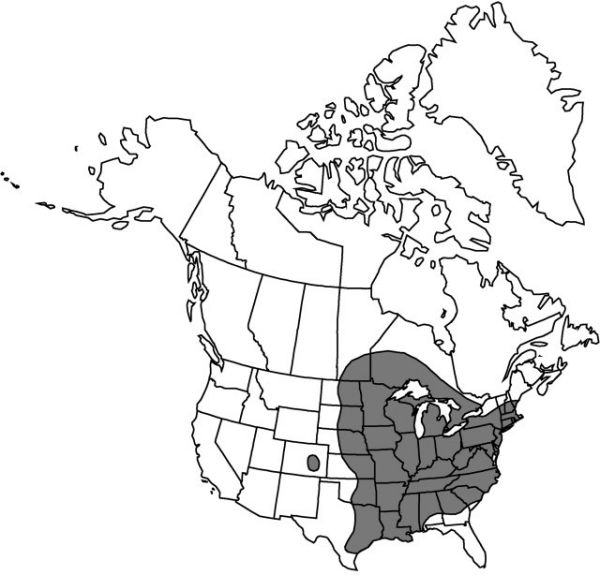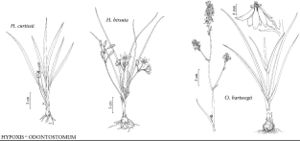Difference between revisions of "Hypoxis hirsuta"
Bull. Torrey Bot. Club 5: 118. 1894.
FNA>Volume Importer |
FNA>Volume Importer |
||
| Line 14: | Line 14: | ||
|name=Hypoxis carolinensis | |name=Hypoxis carolinensis | ||
|authority=Michaux | |authority=Michaux | ||
| − | }}{{Treatment/ID/Synonym | + | }} {{Treatment/ID/Synonym |
|name=Hypoxis erecta | |name=Hypoxis erecta | ||
|authority=Linnaeus | |authority=Linnaeus | ||
| − | }}{{Treatment/ID/Synonym | + | }} {{Treatment/ID/Synonym |
|name=Hypoxis graminea | |name=Hypoxis graminea | ||
|authority=Pursh | |authority=Pursh | ||
| − | }}{{Treatment/ID/Synonym | + | }} {{Treatment/ID/Synonym |
|name=Hypoxis grandis | |name=Hypoxis grandis | ||
|authority=Pollard | |authority=Pollard | ||
| − | }}{{Treatment/ID/Synonym | + | }} {{Treatment/ID/Synonym |
|name=Hypoxis micrantha | |name=Hypoxis micrantha | ||
|authority=Pollard | |authority=Pollard | ||
| − | }}{{Treatment/ID/Synonym | + | }} {{Treatment/ID/Synonym |
|name=Hypoxis pallida | |name=Hypoxis pallida | ||
|authority=Salisbury | |authority=Salisbury | ||
| − | }}{{Treatment/ID/Synonym | + | }} {{Treatment/ID/Synonym |
|name=Hypoxis villosa | |name=Hypoxis villosa | ||
|authority=Rafinesque | |authority=Rafinesque | ||
| Line 47: | Line 47: | ||
|elevation=0–1700 m | |elevation=0–1700 m | ||
|distribution=Man.;Ont.;Sask.;Ala.;Ark.;Colo.;Conn.;Del.;D.C.;Ga.;Ill.;Ind.;Iowa;Kans.;Ky.;La.;Maine;Md.;Mass.;Mich.;Minn.;Miss.;Mo.;Nebr.;N.H.;N.J.;N.Y.;N.C.;N.Dak.;Ohio;Okla.;Pa.;R.I.;S.C.;S.Dak.;Tenn.;Tex.;Vt.;Va.;W.Va.;Wis. | |distribution=Man.;Ont.;Sask.;Ala.;Ark.;Colo.;Conn.;Del.;D.C.;Ga.;Ill.;Ind.;Iowa;Kans.;Ky.;La.;Maine;Md.;Mass.;Mich.;Minn.;Miss.;Mo.;Nebr.;N.H.;N.J.;N.Y.;N.C.;N.Dak.;Ohio;Okla.;Pa.;R.I.;S.C.;S.Dak.;Tenn.;Tex.;Vt.;Va.;W.Va.;Wis. | ||
| − | |discussion=<p>Very rarely, specimens of Hypoxis hirsuta have cylindrical ovaries and/or bracts nearly equaling the pedicels. These specimens are recognized by the umbelliform inflorescence typical of H. hirsuta. The condition appears to be pathological and is associated with a lack of seed development.</p> | + | |discussion=<p>Very rarely, specimens of <i>Hypoxis hirsuta</i> have cylindrical ovaries and/or bracts nearly equaling the pedicels. These specimens are recognized by the umbelliform inflorescence typical of <i>H. hirsuta</i>. The condition appears to be pathological and is associated with a lack of seed development.</p> |
|tables= | |tables= | ||
|references= | |references= | ||
| Line 71: | Line 71: | ||
|publication year=1894 | |publication year=1894 | ||
|special status= | |special status= | ||
| − | |source xml=https://jpend@bitbucket.org/aafc-mbb/fna-data-curation.git/src/ | + | |source xml=https://jpend@bitbucket.org/aafc-mbb/fna-data-curation.git/src/8f726806613d60c220dc4493de13607dd3150896/coarse_grained_fna_xml/V26/V26_343.xml |
|genus=Hypoxis | |genus=Hypoxis | ||
|species=Hypoxis hirsuta | |species=Hypoxis hirsuta | ||
Revision as of 16:43, 18 September 2019
Leaves (1–)2–5(–15) mm wide, soft, flexible, essentially glabrous or sparsely to densely pubescent. Scape (4–)5–17(–25) cm. Inflorescences umbellate, 1–5(–7)-flowered; proximal 2 flowers, when present, always paired; bracts (1–)2–10(–17) mm. Flowers: tepals (3–)6–10(–17) × 2–4 (–5) mm, shorter than pedicel, much longer than ovary; anthers 1.5–3.5(–4) mm; ovary obconic, (1–)2–4 × (1–)2–4 mm, densely pubescent; pedicel (6–)9–25(–30) mm, usually 2+ times longer than bracts. Seeds black, lustrous, (0.9–)1–1.5(–1.7) mm, coarsely muricate.
Phenology: Flowering spring–summer.
Habitat: Wet to dry woodlands and prairies
Elevation: 0–1700 m
Distribution

Man., Ont., Sask., Ala., Ark., Colo., Conn., Del., D.C., Ga., Ill., Ind., Iowa, Kans., Ky., La., Maine, Md., Mass., Mich., Minn., Miss., Mo., Nebr., N.H., N.J., N.Y., N.C., N.Dak., Ohio, Okla., Pa., R.I., S.C., S.Dak., Tenn., Tex., Vt., Va., W.Va., Wis.
Discussion
Very rarely, specimens of Hypoxis hirsuta have cylindrical ovaries and/or bracts nearly equaling the pedicels. These specimens are recognized by the umbelliform inflorescence typical of H. hirsuta. The condition appears to be pathological and is associated with a lack of seed development.
Selected References
None.
